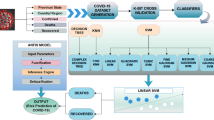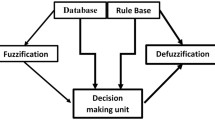Abstract
Coronavirus is a contagious disease that has frightened the globe and continued to threaten the livelihoods of millions of individuals. The detection of COVID-19 has lately become a critical task for medical professionals. Researchers and experts from many areas are working tirelessly to discover preventive ways to preserve the earth from this unseen virus. In disease studies, artificial intelligence approaches have proven to be successful. A Type-2 Fuzzy Logic method has been designed in this work to help in the preliminary diagnosis of whether a patient's symptoms are likely related to a COVID-19 infection. Statistics and information on the rule-based method were obtained from publicly available datasets and databases. Based on the symptoms that the patient exhibits, the algorithm infers the probability of coronavirus contamination. This proposed automated inference method can aid doctors in recognizing diseases and individuals in self-diagnosing.
Access this chapter
Tax calculation will be finalised at checkout
Purchases are for personal use only
Similar content being viewed by others
References
Fegert JM, Vitiello B, Plener PL, Clemens V (2020) Challenges and burden of the Coronavirus 2019 (COVID-19) pandemic for child and adolescent mental health: a narrative review to highlight clinical and research needs in the acute phase and the long return to normality. Child Adolesc Psychiatry Ment Health 14:1–11
Larsen JR, Martin MR, Martin JD, Kuhn P, Hicks JB (2020) Modeling the onset of symptoms of COVID-19. Front Public Health 8:473
Zadeh LA (1965) Fuzzy Sets. Inf Control 8:338–353
Ahamad MM, Aktar S, Rashed-Al-Mahfuz M, Uddin S, Liò P, Xu H, Summers MA, Quinn JM, Moni MA (2020) A machine learning model to identify early stage symptoms of SARS-Cov-2 infected patients. Expert Syst Appl 160:113661
Zoabi Y, Deri-Rozov S, Shomron N (2021) Machine learning-based prediction of COVID-19 diagnosis based on symptoms. npj Digital Med 4(1):1–5
Chowdhury AA, Hasan KT, Hoque KKS (2020) Analysis and prediction of COVID-19 pandemic in Bangladesh by using Long Short-Term Memory Network (LSTM) and Adaptive Neuro Fuzzy Inference System (ANFIS)
Shatnawi M, Shatnawi A, AlShara Z, Husari G (2021) Symptoms-based fuzzy-logic approach for COVID-19 diagnosis. Int J Adv Comput Sci Appl, 444–452
Choudhury SH, Aurin AJ, Mitaly TA, Rahman RM (2021) Predicting the possibility of COVID-19 infection using fuzzy logic system. Int J Intell Inf Database Syst 14(3):239–256
Lauraitis A, Maskeliūnas R, Damaševičius R (2018) ANN and fuzzy logic based model to evaluate Huntington disease symptoms. J Healthcare Eng
Thukral S, Bal JS (2020) Fuzzy logic: an easiest technique to predict Celiac Disease. Sci Technol J 7(2):89–94
Manikandan T, Bharathi N, Sathish M, Asokan V (2017) Hybrid neuro-fuzzy system for prediction of lung diseases based on the observed symptom values. J Chem Pharm Sci ISSN 974:2115
Fale MI (2020) Flynxz–A First Aid Mamdani-Sugeno-type fuzzy expert system for differential symptoms-based diagnosis. J King Saud Univ-Comput Inf Sci
Kahtan H, Zamli KZ, Fatthi WNAWA, Abdullah A, Abdulleteef M, Kamarulzaman NS (2018) Heart disease diagnosis system using fuzzy logic. In Proceedings of the 2018 7th international conference on software and computer applications, pp 297–301
Sibiya M, Sumbwanyambe M (2021) Automatic fuzzy logic-based maize common rust disease severity predictions with thresholding and deep learning. Pathogens 10(2):131
Thakur SAPNA, Raw SN, Sharma R (2016) Design of a fuzzy model for thalassemia disease diagnosis: Using mamdani type fuzzy inference system (FIS). Int J Pharm Pharm Sci 8(4):356–361
Husin NA, Alharogi A, Mustapha N, Hamdan H, Husin UA (2018) Early self-diagnosis of dengue symptoms using fuzzy and data mining approach. In AIP conference proceedings, vol 2016, no 1. AIP Publishing LLC, p 020048
Novel Corona Virus 2019 Dataset. https://www.kaggle.com/sudalairajkumar/novel-corona-virus-2019-dataset
COVID-19 Open Research Dataset Challenge. https://www.kaggle.com/allen-institute-for-ai/CORD-19-research-challenge
Wu D, Mendel JM (2007) Enhanced Karnik-Mendel algorithms for Interval Type-2 fuzzy sets and systems. In NAFIPS 2007–2007 annual meeting of the north american fuzzy information processing society. IEEE, pp 184–189
Author information
Authors and Affiliations
Corresponding author
Editor information
Editors and Affiliations
Rights and permissions
Copyright information
© 2022 The Author(s), under exclusive license to Springer Nature Singapore Pte Ltd.
About this paper
Cite this paper
Mahanty, C., Kumar, R. (2022). COVID-19 Patients Prediction Based on Symptoms Using Fuzzy Logic Approach. In: Pattnaik, P.K., Sain, M., Al-Absi, A.A. (eds) Proceedings of 2nd International Conference on Smart Computing and Cyber Security. SMARTCYBER 2021. Lecture Notes in Networks and Systems, vol 395. Springer, Singapore. https://doi.org/10.1007/978-981-16-9480-6_21
Download citation
DOI: https://doi.org/10.1007/978-981-16-9480-6_21
Published:
Publisher Name: Springer, Singapore
Print ISBN: 978-981-16-9479-0
Online ISBN: 978-981-16-9480-6
eBook Packages: Intelligent Technologies and RoboticsIntelligent Technologies and Robotics (R0)




